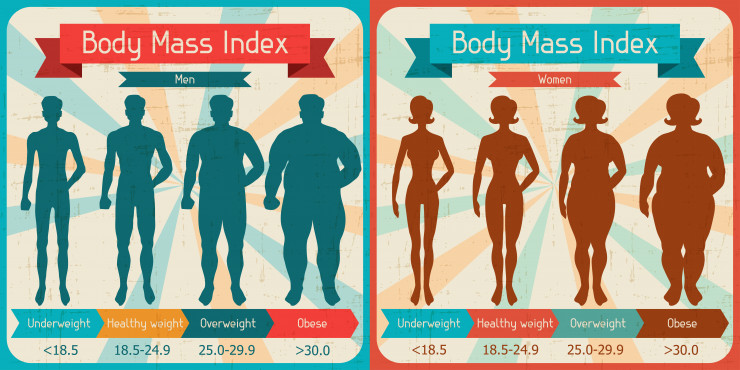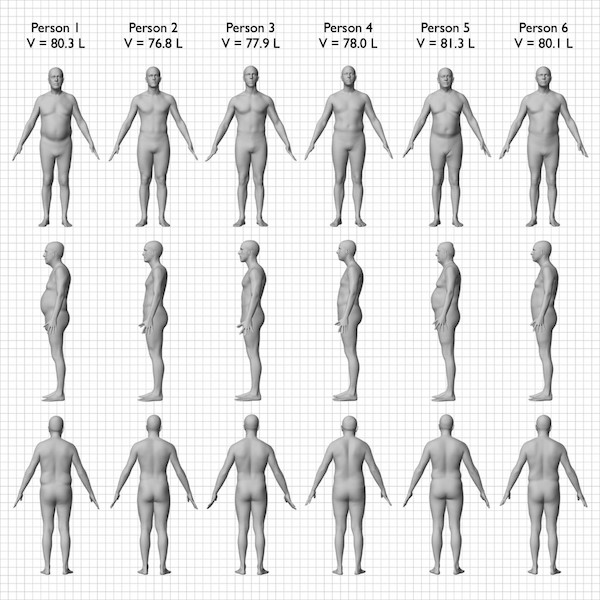If you have ever been on a regular Dr. visit or participated in a wellness program through your employer, there is a pretty good chance that you have been exposed to the concept of BMI. Surprisingly, this is still a widely used guideline for measuring your health despite the fact that the inputs for determining your BMI are pretty vague and non-specific. Given this, your individual BMI can be very misleading when compared to the “standard”.
Keep reading to learn more about BMI and why it really isn’t the best way to measure your overall health. I’ll also include some more effective ways to gauge your health and level of fitness.
What is BMI?
Body Mass Index (BMI) is a measure of body fat based on your weight in relation to your height, and applies to most adult men and women aged 20 and over.

BMI Formula
The calculation for BMI is pretty straight forward. Here are the two ways to calculate BMI based on your system of measurement.
Metric BMI Formula |
Imperial BMI Formula |
|---|---|
| BMI = weight (kg) /height2 (m2) | BMI = ( weight (lb) / height2 (in2) ) x 703 |
BMI Categories
The standard weight status categories associated with BMI ranges for adults are shown in the following table:
| BMI | Weight status |
|---|---|
| Below 18.5 | Underweight |
| 18.5-24.9 | Healthy |
| 25.0-29.9 | Overweight |
| 30.0 and above | Obese |
BMI of less than 18.5 – Underweight
BMI of 18.5-24.9 – Normal/Ideal weight
BMI of 25-29.9 – Overweight
BMI of over 30 – Heavily overweight
Calculate Your BMI
At this point, you may be interested to know what your actual BMI. Below you will find a calculator that uses the Imperial formula to determine BMI.
Why BMI Isn’t A Good Measure of Health
BMI doesn’t account for body composition. Body composition is the percentages of fat, bone and lean muscle mass in your body. BMI also does not account for body fat – the percentage of lean muscle mass compared to your overall weight.
The NY Times published an article that demonstrated how BMI can be misleading. You can have several individuals that have the relatively same BMI, however, when comparing the body composition of this group, the differences are pretty stark and contrasting. Take a look at the following image:
As you can see all of these individuals had a similar BMI, but varying body compositions.
Check this out!
If you want to see significant differences in your body fat levels and thus change your body composition, you need to focus on energy balance. Energy Balance – Your Key to Fat Loss
Based on the categories above, I (a male, 5 ft 10 in, 178 lb = 25.54 BMI) would fall into the “overweight” (25 – 29.9) category…?!?!?! Here is a photo that I posted to Instagram recently, I’ll let you be the judge on my “overweight” status.
More Important Health Factors
Don’t get me wrong here…BMI can be “a factor” for determining your current level of health. However, it definitely SHOULD NOT be the ONLY factor that is considered.
Progress is more important than the number on the scale!
- Body composition
- You are stronger and faster
- Your clothes fit better
- You enjoy the challenge of your workouts
- It’s become a habit for you
- You have more energy and less stress
Do you have other ways that you measure progress? If so, please share in the comments below!
Need a Coach?
If you need to find someone that will hold you accountable, answer your questions, help you, and PUSH YOU for the entire duration of your workout! Luckily for you, that’s what me and my team are here for. If you don’t have a coach yet and want one, I’d love to be your coach and help you through a fitness program. I am available to help you reach your goals!

Email Me: coachchris@yourfitnesspath.com
Connect on Facebook: fb.com/coachcoburn
YouTube: https://youtu.be/coachchriscoburn
Instagram: @chris_coburn
Twitter: @yourfitnesspath




0 Comments